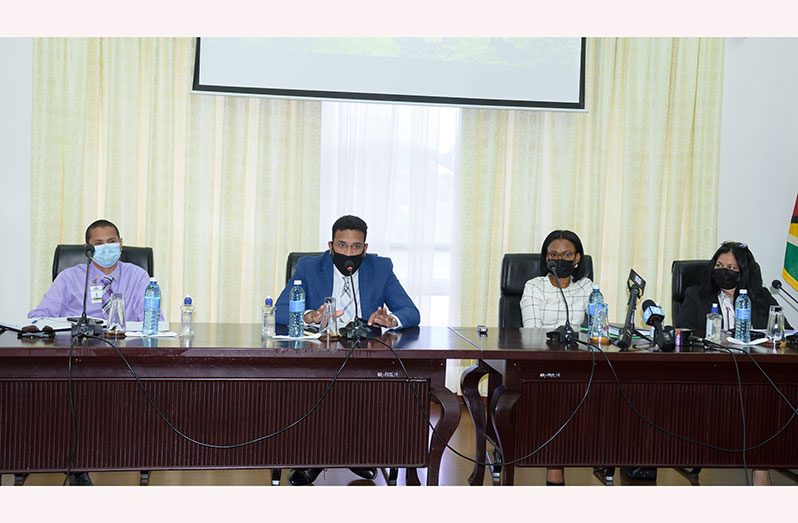THE local ‘scrap metal’ trade, which was abruptly suspended on September 30, 2020, will resume on Thursday, April 8, 2021, under a revamped system which will see concentrated efforts by multiple stakeholders to monitor the industry.
This was announced by Minister of Tourism, Industry, and Commerce, Oneidge Waldron, during a stakeholder consultation held by the ministry, at the Arthur Chung Conference Centre, on Thursday.
Also in attendance at the meeting were head of the Customs Anti-Narcotics Unit (CANU), James Singh; Deputy Commissioner of Customs at the Guyana Revenue Authority (GRA), Gavin Low and Permanent Secretary of the Ministry of Tourism, Industry, and Commerce, Sharon Roopchand-Edwards.

Minister Walrond, in her remarks to stakeholders, said two units were established to facilitate the trade process, a Scrap Metal Unit at the ministry, and another external unit comprising CANU, GRA, the Guyana Police Force (GPF), the Guyana Telephone and Telegraph Company (GTT), Digicel and E-Networks.
The multi-stakeholder units will examine all outgoing scrap metal container shipments for narcotics and interdict same. There is a standard operating procedure recommended which was agreed upon for the examination of shipments.
After scrutiny of “customs documents” and a list of information which the shipper must provide, the cargo will be examined in the presence of the shipper, whose identity will also have to be verified, and photos will be captured of the container prior, during and subsequent to loading.
The empty container as well as the cargo will also be examined in the presence of the shipper as well as any officer from the units, who will be equipped with body cameras. Following the completion of this process, the container will be sealed in the owner’s presence and a photo of the seal will be taken.
The shipper will have to sign a form prepared by CANU, after the examination, and the sealed container will be escorted to the container scanner by CANU, officers from the other agencies and the shipper.
The scanned container will then be escorted to the designated wharf by the parties involved, and monitored prior to loading onto its designated vessel.
If the container is not shipped within seven days, it will be escorted back by CANU, officers from other agencies and the shipper, to be scanned for a second time and then transported back to the wharf.
AUTHORISED SCRAP METAL YARDS
Noteworthy, Minister Walrond mentioned that loading of the containers will be permitted only at authorised scrap metal yards. Authorisation is granted by the Ministry of Tourism, Industry and Commerce, following an inspection of the facility and after the yard meets the requirement of 24-hour closed-circuit television (CCTV) monitoring.
Further, she noted that for now, no new licences will be issued for new shippers to join the scrap metal trade, and only persons who are already licensed scrap metal exporters will be permitted to perform the trade.
“This is so we’re able to get more handle of the process of the trade and so understand, streamline and strengthen the processes,” she said.
Waldron explained that the extended hiatus is consequent to the ministry ensuring that the many “gaps” which existed in the previous operations were remedied, and that authorities are pleased with the new measures which may fill those gaps.
It was noted by sections of society that the reason for the closing of the industry was due to the seizure of a shipment of 11.5 tonnes of cocaine in Belgium, November last, which was found in a shipping container packed with scrap metal.
Minister Walrond explained the decision to close the trade was not due to the cocaine bust, however, an attempt by the new People’s Progressive Party Civic (PPP/C) administration to assess and restructure the scrap metal industry, to improve its performance under a new process.
Stakeholders present at the consultation exercise raised a number of concerns in terms of the efficiency of the process due to its intricate nature; however, they were assured by Singh and Low that efforts were made by CANU and GRA to ensure that the process is efficient.
Minister Walrond said that authorities already contemplated that the new regulations and procedures might be subject to minor setbacks during the implementation process; however, the units are committed to addressing issues as they arise.
“We want to facilitate the trade, we want to make an enabling environment for economic activity to resume in this sector … this is government’s resolve to have the trade reopened and it’s not to hinder any sort economic activity,” she noted.




.jpg)










